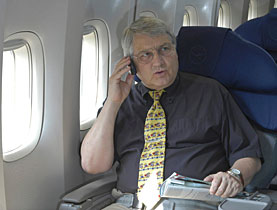Talk on the go is cheap – just not for the Swiss

Swiss mobile phone companies have achieved an unprecedented market penetration rate despite charging higher fees than their European counterparts.
In 2007, Switzerland’s five mobile phone operators added 69,000 new users to their rolls, meaning there are now more mobile connections than people in Switzerland.
The Federal Communications Office, Switzerland’s broadcasting and telecommunications regulator, presented the information as part of its annual report released on Wednesday.
On average, customers spent SF60 ($58) per month on service in 2007, or anything up to SFr38 more than their continental neighbours, depending on the level of service provided.
While per-minute rates had decreased both in Switzerland and in the European Union between October 2005 and October 2007, the Swiss continued to pay 33 per cent more.
They were also charged among the highest contract termination penalties.
Philipp Metzger, the head of telecommunication services for the Communications Office, told swissinfo that higher capital costs in establishing networks, spread over relatively fewer consumers, as well as more stringent regulatory requirements contributed in part to higher fees.
“We have on the one hand have to look at the cost structure, and on the other hand, you also have to look at the behaviour of consumers,” he said.
Swiss are reluctant to jump ship to the carrier offering the lowest rates, added Metzger. Out of “stoic loyalty”, the majority have stuck with former state-run monopoly Swisscom.
It dominates the mobile market with a 61.9 per cent market share. In the rest of Europe, former monopolies have on average a 39.4 per cent market share.
“[Consumers] seem to have a hard time changing – even if they see new price schemes advertised, it still isn’t enough for them to swap,” said Metzger.
Growth
The market for mobile service in Switzerland continues to grow.
The country’s five providers reached a record level of market penetration: in the last quarter of 2007, there were eight million service plans or pre-paid SIM cards registered, or a level of 106.38 per cent.
In 2004 the rate was 86.7 per cent in Switzerland compared with 84.6 per cent in the rest of Europe.
Today, Italy, Luxembourg and the Baltic states range between 140 and 150 per cent penetration. France comes in at 83 per cent.
Of users in Switzerland, roughly 43 per cent called using pre-paid cards while 57 per cent had a monthly subscription. In the European Union, 61 per cent of people call from a pre-paid number and 39 per cent own subscriptions.
Still, only seven per cent of Swiss use the mobile phone as their primary communication device. The EU average is more than double that according to Metzger.
In contrast to wireless services, Swiss land lines were among the least expensive in Europe, particularly for international service.
swissinfo
Austria: 119.17% (end of 2007)
Belgium: 101.33%
Britain: 120.94%
Denmark: 111.88%
Finland: 115.25%
France: 89.20%
Germany: 112.31%
Greece: 142.37%
Ireland: 122.36%
Italy: 148.05%
Luxembourg: 137.80%
Netherlands: 104.59%
Portugal: 123.24%
Spain: 121.59%
Sweden: 116.45%
Switzerland: 106.38%
United States: 84%
Only 3% of consumers worldwide recycle their mobile phones according to Finnish manufacturer Nokia.
Its global recycling survey published on Tuesday shows that three quarters of those polled have never considered recycling their old devices.
Nearly half of the 6,500 people surveyed in 13 countries, who on average own five phones, said they did not even know it was possible to recycle their mobiles.
About 44% keep their old phones at home, while 4% admitted to having just dumped them somewhere.
According to Nokia, up to 80% of a phone can be recycled for other uses.

In compliance with the JTI standards
More: SWI swissinfo.ch certified by the Journalism Trust Initiative










You can find an overview of ongoing debates with our journalists here . Please join us!
If you want to start a conversation about a topic raised in this article or want to report factual errors, email us at english@swissinfo.ch.